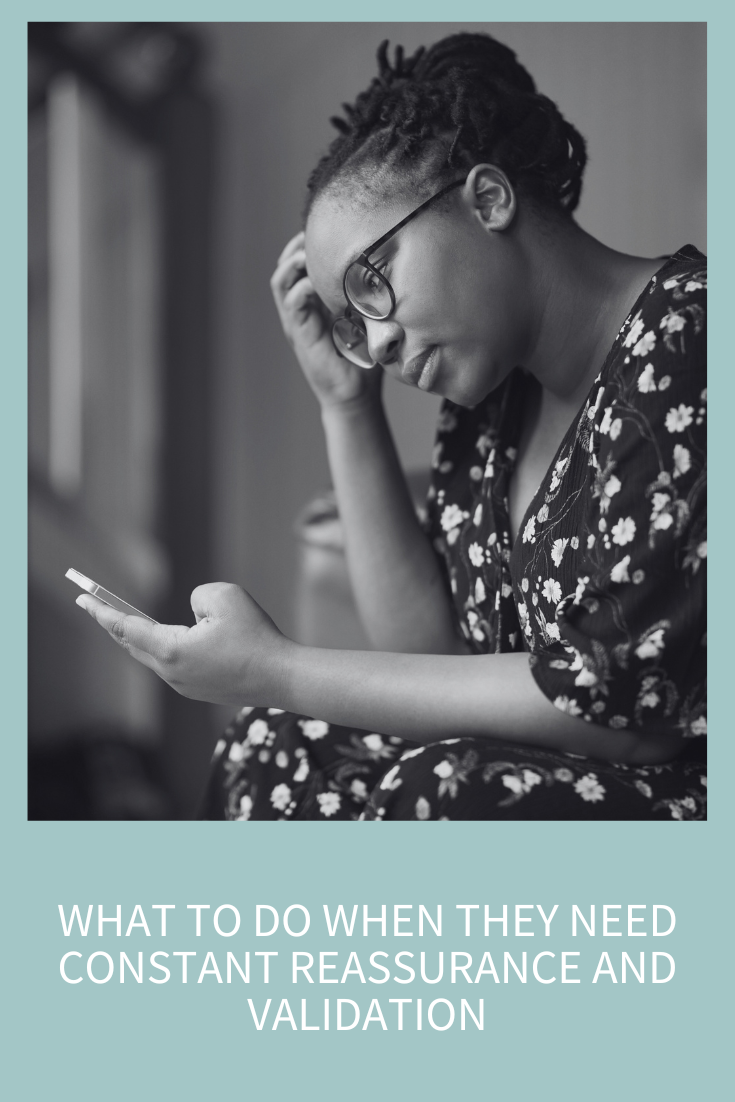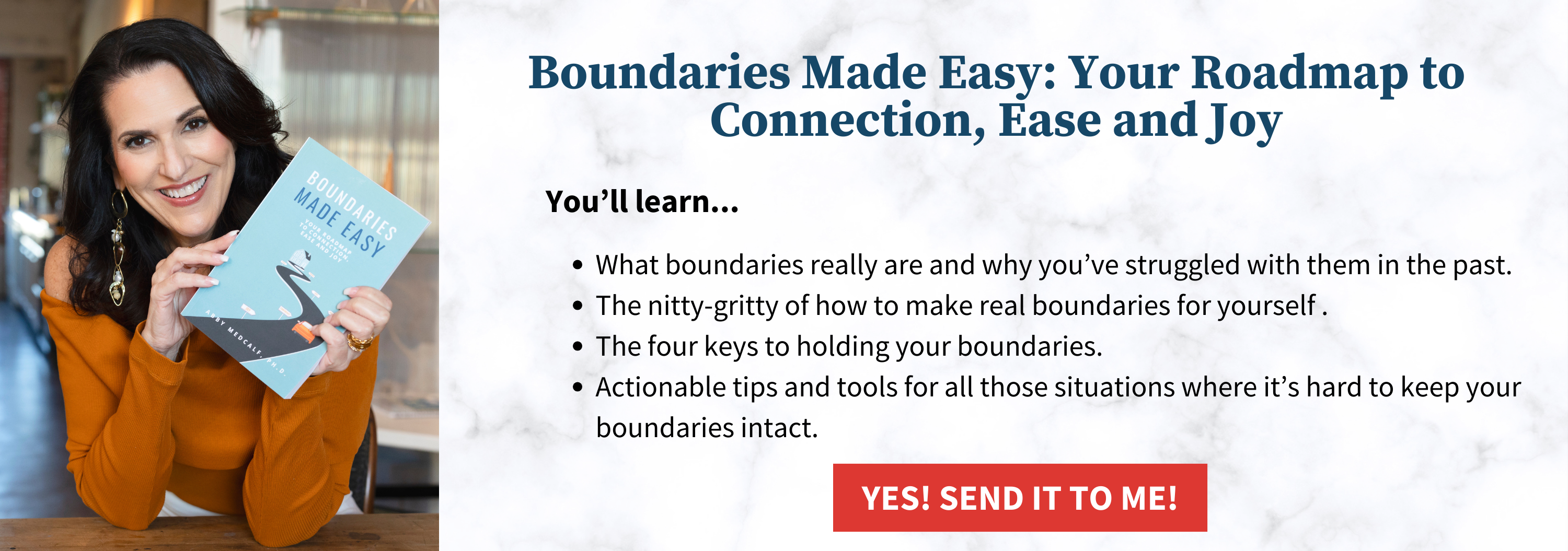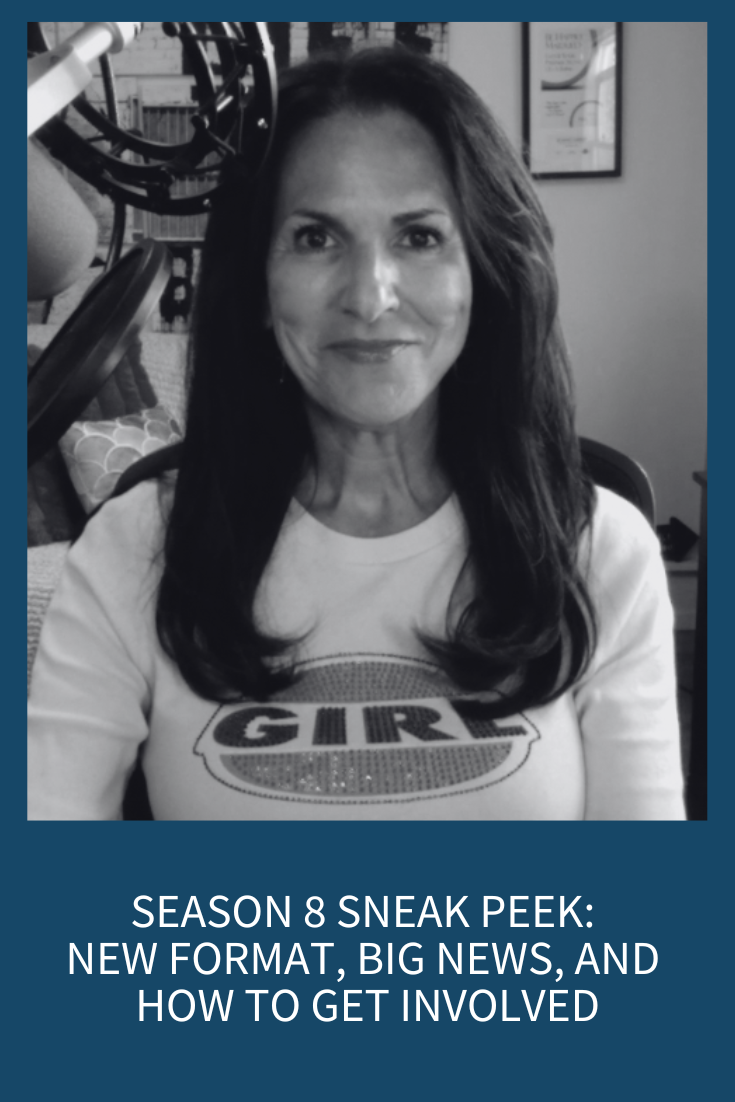
We’ve all had that person in our lives who constantly needs reassurance. Whether it’s your partner asking, “Do you really love me?” for the tenth time this week, your mom needing praise every time she tries something new, or a coworker who looks to you for approval on every decision, these interactions can leave you feeling exhausted, frustrated, and even resentful.
But why are some people like this? And, more importantly, what can you do to manage these relationships while staying compassionate and maintaining your boundaries? In today’s episode, I’ll answer all your questions and give you my five-step process for what you can do to create more balanced and healthy relationships, so stay tuned!
7-minute read
Introduction
You’re here with me now because you’re in some type of relationship where the other person consistently seeks out your support, agreement, and assurance, but it’s never enough! They say things like, “You say you love me, and you do all these things, but do you really?” And, while you might feel loving and patient once or twice, the constant need has you so exasperated that you walk away from them or snap! And then you’re the bad guy. And now they feel disconnected from you so their need for reassurance goes into overdrive, and you find yourself trapped in an unhealthy cycle.
Needing constant reassurance and validation is all about insecurity. Hard stop. Yup. It’s that simple. Now, why they’re insecure can have many roots but, when it comes to what you should “do” when someone needs constant reassurance and validation, it’s all about dealing with their insecurity, not trying to reassure or reason with them (which is what you’ve likely been doing and why you feel drained by this relationship).
Some of the signs you might see include:
- Frequent checking: They repeatedly ask for confirmation about your feelings, decisions, or opinions (e.g., “Are you sure you’re not mad at me?”).
- Over-apologizing: They say “sorry” excessively, even for things that don’t warrant an apology.
- Seeking praise for small actions: They need recognition for routine tasks or minor achievements.
- Difficulty making decisions: They can’t act without asking for your input or approval.
- Constant texting or calling: They seek continual connection to feel secure.
- Wanting constant physical touch. I’m going to get some hate for this one, but those love languages are largely bullshit with scarce to little scientific evidence. If someone says their love language is physical touch, that’s fine. But if they can only feel your love with physical touch, then that’s a mental health issue. It’s like saying, “I can only feel calm once I’ve had a drink.”
Why Some People Need Constant Reassurance and Validation
Let’s take a minute and talk about the why before we get to what you want to do since this might change your approach in subtle ways.
I. Mental Health Issues
First things first, needing constant reassurance and validation might be linked to a mental health issue such as anxiety or borderline personality disorder. The amygdala, the brain’s fear center, becomes hyperactive in people who are anxious, signaling danger even when there is none. This heightened state makes them feel quite insecure, so they seek external validation to feel safe.
II. Childhood Dysfunction or Trauma
If someone grows up in a dysfunctional household and/or has experienced trauma, being insecure is a likely outcome. Mostly, this boils down to a deep fear of abandonment or rejection.
People with a fear of abandonment are often seen as clingy and needy. They seek constant reassurance and validation from others to feel secure in their relationships. This can involve excessive texting or calling and a strong desire to be physically close to the ones they love. They may go out of their way to please others, often at the expense of their own needs and wants.
Unmet needs during childhood are a part of this. This might be due to:
- Inconsistent parenting: If a parent was loving and attentive one moment but neglectful or critical the next, the child might grow up constantly seeking reassurance to avoid feelings of abandonment.
- Overprotective environments: Parents who were overly involved in their child’s decisions might unintentionally teach the child to depend on others for validation.
- Criticism and conditional love: A childhood marked by criticism can create adults who constantly seek affirmation to counteract feelings of inadequacy.
III. Their Attachment Style
People with an anxious attachment style, formed in early childhood, tend to rely heavily on external validation. They grew up associating love and safety with approval and reassurance from caregivers. These individuals never learned how to self-soothe, so they rely on others to regulate their emotions.
The Five Steps for Dealing with Someone Who Needs Constant Reassurance and Validation
Here are the five steps to navigate the relationship while maintaining compassion and your own boundaries.
Step One: Empathy
First things first, I want you to be empathetic without being sympathetic. You can acknowledge their feelings but don’t “do” anything.
Step Two: Don’t Reassure
Do not, under any circumstances, reassure. You already know this is a losing game. After you acknowledge feelings, your only job is to be silent or ask questions to help the other person understand their own behavior and what they (not you) need to do about it.
Step Three: Set Your Boundaries
Be clear about your boundaries when it comes to their asking for constant reassurance or validation. Also, be clear about your boundaries if this comes up as them wanting constant physical touch, sex, or wanting to spend every moment possible together. A great boundary to have is that you’ll never repeat an answer. For example, if they ask, “Do you love me?” and you’ve answered, “Very much,” don’t answer again if they ask again. Another great boundary is if you say, “I love you,” and they say, “Really?” to not remark on that response at all. Don’t get sucked in or give a list of all the ways you’re loving. If anything, you might ask a question: “Can you name any loving things I’ve done or said to you in the last week?” And have a productive conversation from there.
You can also say, “What did you just hear me say?” And, when you tell them you love them or do something for them, you can also ask them about their experience of that conversation or in that moment. Often, you think you’re super-connected and they don’t.
Step Four: Loving Detachment
With healthy boundaries in place, practice loving detachment (emphasis on loving).
Step Five: Therapy
If this behavior continues, you might suggest therapy for the other person (or couples if this is a romantic relationship). No matter what, be clear and loving that this is, at the very most, a “we” problem but likely something they need to work through. You’re happy to support them in this process, but you refuse to continue to reassure or validate them. And it’s never your responsibility to “make them feel better or more secure.”
Using the “we” approach, you might suggest practicing mindfulness together or setting intention daily with them.
Get my 3 Steps for Convincing Someone to Go to Therapy
If someone’s need for reassurance begins to affect your mental health or well-being, it’s okay to reevaluate the relationship. Remember, you’re not responsible for fixing anyone—you can only support them while taking care of yourself.
Wrap Up
Remember, insecurity is the other person’s responsibility, not yours. It doesn’t mean you can’t support them in getting the help they need, but it does mean that you don’t take ownership or blame for their issue. No matter your actions, you don’t make others insecure.
They need to focus on the inside, not the outside. Too many people try to base their feelings of security on external things like a partner, money, job, education, or how they look, but that’s like trying to fill a funnel. It never works because your feelings of security just leak out the bottom so you’re always looking for more and never feel good in your moments. They’ve got to start overcoming their insecurity by liking themselves regardless of what’s happening “out there.”
Resources for What to Do When They Need Constant Reassurance and Validation
Overcoming Insecurity and Silencing Your Inner Critic
Do the Love Languages Really Work?
Ask Dr. Abby: I Feel Unloved and Not Good Enough. Is This a Me Problem Or Is My Partner Causing It?
The Secrets to Effectively Dealing with Stress and Anxiety Part Two
How to Cope When a Loved One Has Borderline Personality Disorder
How Childhood Trauma Affects Relationships
How to Overcome Your Fear of Rejection and Abandonment
How Your Attachment Style Affects Your Personal Relationships
Empathy in Relationships Is the Key to Connection and Communication
Boundaries: How to Identify Them and How to Hold Them
Three Steps to Loving Detachment







